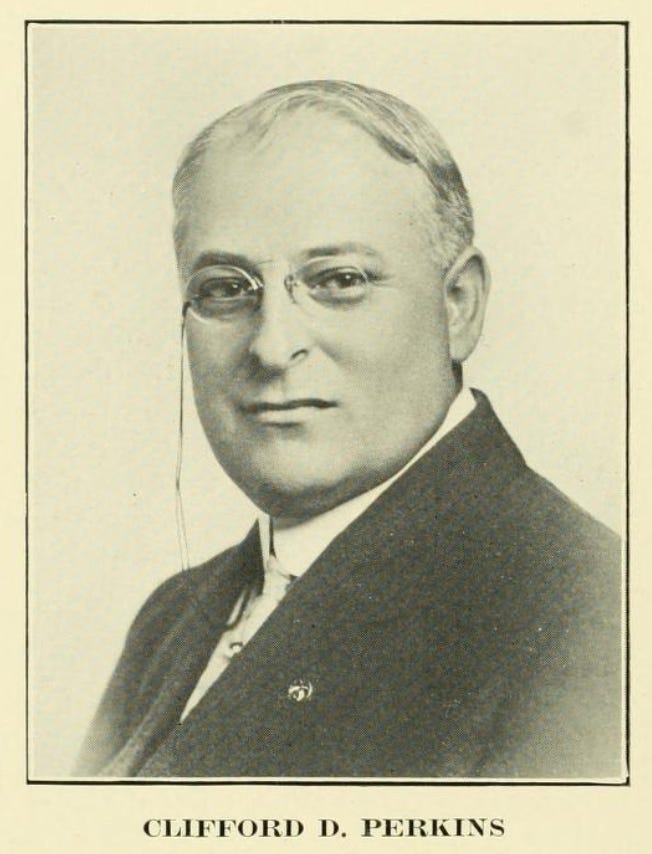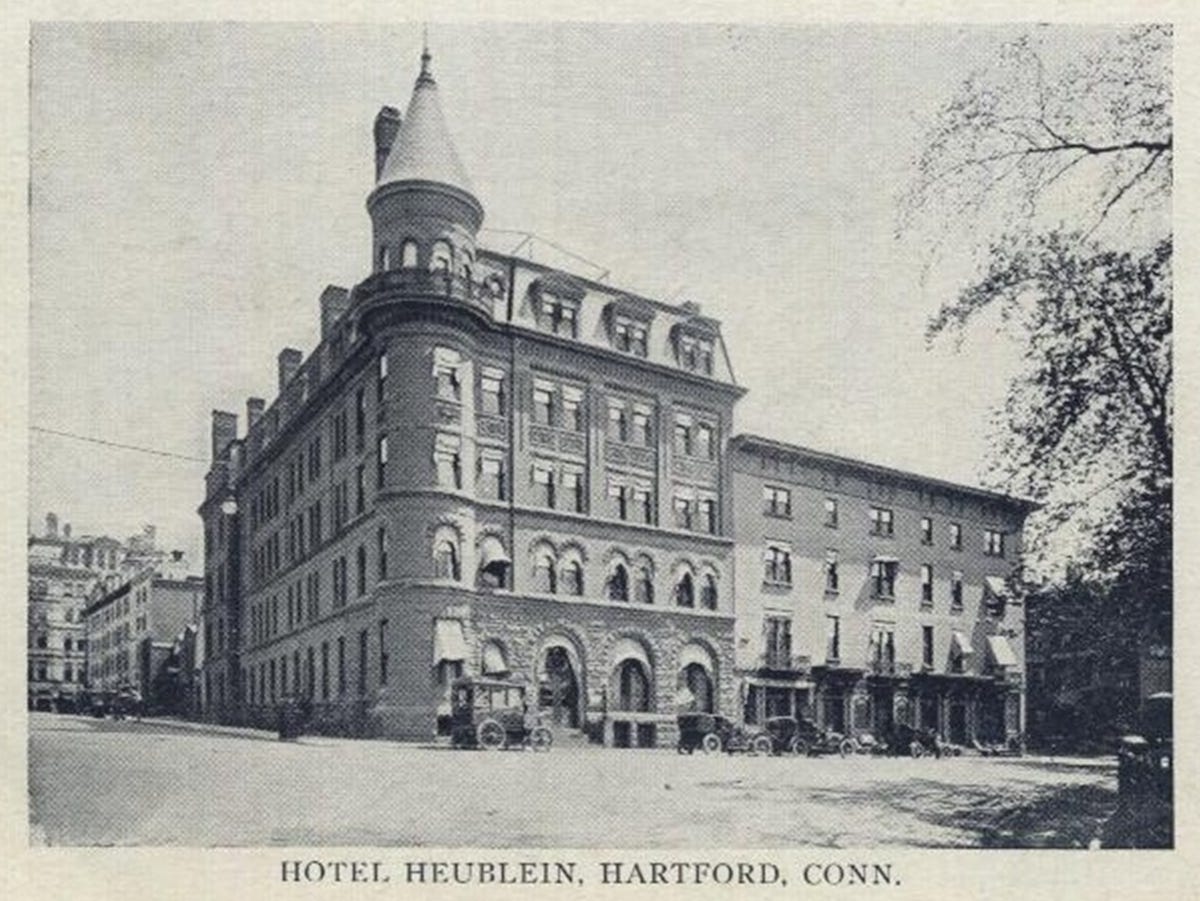The Hotel Heublein
Before he built the famous Tower, G. F. Heublein had a successful hotel and restaurant and a prosperous liquor business
Recently, someone asked me about the Hotel Heublein. They had just visited the Heublein Tower on Talcott Mountain, where the hotel was pictured on an exhibition label. The Tower, of course, is a well-known local landmark, a centerpiece of Talcott Mountain State Park. The same-named hotel, on the other hand, was demolished over 60 years ago. It stood at the corner of Wells and Gold Streets, across from Bushnell Park in downtown Hartford. The Bushnell Tower high-rise condominium building dominates this corner today.
A while back, I briefly mentioned the Hotel Heublein in one of my videos. The video focused on the large area where Bushnell Plaza was constructed in the early 1960s. The was during the period when the city was undergoing a massive wave of redevelopment. The concrete expanse of Bushnell Plaza, with its associated apartment buildings and the MDC headquarters, replaced a densely built-up section of the city along Main Street, between Gold Street on the north and Wells Street to the south and west.
It Started on Mulberry Street
Directly across from the Wadswoth Atheneum was Mulberry Street, which ran for a block through the middle of this area, from Main to Wells. Back in the day, Mulberry had a distinctly German character. Here one could find German food, German-language books, a German steamship agency and a rooming house for newly arrived German immigrants. One such immigrant, who arrived in Hartford in about 1859, was Andrew Heublein. Born in the Kingdom of Prussia in 1820, he left Europe in the aftermath of the Revolution of 1848. Coming to Hartford by way of Beacon Falls (where he worked for the Goodyear Rubber Company) and New Haven, he soon established a cafe and small hotel in a 4-story building at the corner of Mulberry and Wells.
In 1875, Andrew Heublein stepped away from the business and handed it over to his sons, Gilbert and Louis. Under the name G. F. Heublein & Bro., they would greatly expand and diversify their operations, making Heublein a nationally known brand as wholesale importers of wine and liquors. In 1881, the brothers enlarged the original cafe by adding a new taproom and devoting their original bar room exclusively for use as a restaurant. A decade later, in 1890-91, came an even more dramatic addition: just north of their original building, they erected a 5-story hotel at the corner of Gold and Wells Streets. The Heublein business now occupied an entire block of Wells Street, from Mulberry to Gold Streets.
Hotel Heublein’s Early Years
Designed by the Hartford architectural firm of Barrett Brothers & Co., the new hotel had a stone facade on the ground floor, above which were three brick floors and, above them, the upper story was a mansard roof with dormer windows. The building had a frontage of sixty feet on Wells Street and 160 feet on Gold Street and had a rounded corner on the northwest side that rose into a tower with a typically Victorian conical roof. The interior, which extended into the adjoining building (where Andrew Heublein had started the business three decades earlier) featured a bar room, separate gentlemen’s and ladies’ cafes, gentlemen’s reading and writing rooms, a parlor and two private dining rooms. It was a relatively small hotel but what it lacked in size it made up for in its high degree of elegance and lavish decoration.
By 1904, the Heublein had two basement rathskellers and in 1900 the hotel unveiled its summer rooftop garden, where guests would find small tables for refreshments (orders sent downstairs by telephone) set amid colored electric lights, boxes of blooming plants and several varieties of palm. By 1906, as noted in the Hartford Courant, the garden also featured an “orchestra of young ladies, who possess an unusual skill in the playing of popular music.”
As the hotel thrived, the Heublein brothers were rapidly advancing their other enterprises as well. In 1896, they erected a new building for their wholesale liquor business at 196 Trumbull Street, a structure that still exists today. In 1892, G. F. Heublein & Bro. produced the world’s first bottled cocktail and in 1906 the company began selling A1 Steak Sauce in the United States, under license from Brand & Co. Ltd. in the U.K. When supplies became scarce during World War One, Heublein made an arrangement to begin manufacturing the sauce in Hartford. Production of A1 Steak Sauce carried the company through the years of Prohibition, when its liquor operations had to shut down.
The Hotel passes to Other Owners
The growth of his liquor business demanded increasing amounts of Gilbert F. Heublein’s attention. He had personally undertaken the management of the hotel during its early years, but he soon came to rely on others to oversee its operations. In 1914, a year after ambitious plans to replace the Hotel Heublein with a much larger 14-story hotel fell through, Heublein began work on an even loftier edifice: the tower on Talcott Mountain that would serve as a summer home for him and his wife, Louise Gundlach Heublein. The following May, there were rumors that Heublein might close the hotel for the summer. He told a reporter from the Hartford Courant that if he did decide to give up the hotel, he’d do it for good and that “it would be for the sake of escaping the responsibility.” A few days later it was announced that Heublein had leased the hotel to new manager, Clifford D. Perkins. Perkins would run the Heublein for over two decades, eventually taking over ownership from Heublein.

Perkins, who since 1914 had been manager of the Highland Court Hotel on Windsor Avenue, wasted no time commencing a thorough renovation of the Heublein, starting with the upper floor. As the Hartford Courant noted on July 27, 1915:
Every room on the top floor has been redecorated a light cream, the woodwork and furniture lightened, the floor scraped and revarnished a light oak, so that the whole affords a most pleasing sensation to the eye. In every room, Turkish rugs have been placed, which harmonize with the furnishings. Each room is now furnished with new brass beds, curtains and draperies.
Perkins continued his modernizations in the following years. He rebuilt the hotel’s main dining room in 1922, replacing the old stained glass windows with French plate glass, as the room’s original Victorian look gave way to a more stylish Colonial interior.
Prohibition hit Hartford’s hotel and restaurant proprietors hard, but with its repeal in 1933, Perkins could claim the distinction of receiving the first permit for the retail sale of beer in the state. As the Courant reported, Perkins requested of his old friend, Collector Robert O. Eaton of the IRS, that his application for the Hotel Heublein become Permit No. 1. In spite of this success, business had not been going well for some time. In 1937, the same year that the hotel’s founder Gilbert F. Heublein passed away, Perkins was displaced as manager by the building’s mortgage-holder, the Aetna Life Insurance Company. They foreclosed on the establishment the following year and in 1939 sold it to John Harris of the Hotel Garde.
The Heublein Lounge and the Hotel’s Final Years
In 1955, Harris sold the Heublein to a new group of owners from West Hartford who declared their intention to restore the hotel to its “old tradition.” Initially there were conflicts between the property owners and the hotel’s manager, Murray Karnell, but he eventually foreclosed on a loan he’d made to the owners and took possession of the Heublein himself. In 1957, Karnell renovated and modernized the hotel’s ground floor, including the cocktail lounge off Gold Street. For years, the Heublein Lounge was a popular and elegant part of the city’s night life, known for the many jazz musicians who performed there. Legendary Hartford bandleader and booking agent Paul Landerman brought well-known names to the Heublein, such as Dizzy Gillespie, Teddy Wilson and Cannonball Adderley.
By the spring of 1963, Karnell was under pressure from the Hartford Health Department to make improvements to the hotel kitchen. Karnell knew the building would sooner or later be razed to make way for the Bushnell Plaza development, so he was reluctant to undertake costly repairs. Instead, he opted to stop serving food altogether. This put his liquor permit in jeopardy, since Connecticut did not allow a hotel to have a liquor license without also serving hot food. Karnell decided to close the Heublein Lounge and not renew the liquor license when it expired the following month, although the hotel continued to rent rooms. Two years later the building was demolished, almost 70 years after Heublein brothers had opened the Gold Street hotel and over a century after their father, Andrew Heublein had first started business on Mulberry Street. The hotel was gone, but the Heublein alcohol and food business continued to thrive for many years and Heublein Tower continues to welcome thousands of visitors each year.
I hope you enjoyed this article about the Hotel Heublein. Please consider leaving feedback in a comment. Do you have memories of the Heublein Hotel or the Heublein Lounge? What did you like most about this story and are there things you would want to know more about? What other Hartford-related topics are you interested in learning about?
Please share this article with anyone you think might enjoy it! Also, consider subscribing to this newsletter or upgrading to a paid subscription. Your support means so much to me!






